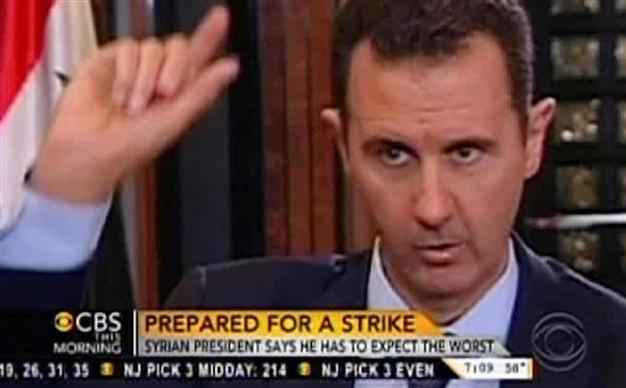Assad warns US will 'pay the price' if it attacks Syria
WASHINGTON - Agence France-Presse

In this frame grab from video taken Sunday, Sept. 8, 2013, and provided by "CBS This Morning," Syrian President Bashar Assad responds to a question from journalist Charlie Rose during an interview in Damascus, Syria. AP Photo
Syrian President Bashar al-Assad warned Washington on Monday to brace for retaliation if US forces attacked his war-torn country, as he denied using chemical weapons against his people."You're going to pay the price if you're not wise. There are going to be repercussions," Assad told CBS television's "This Morning." "It's an area where everything is on the brink of explosion. You have to expect everything." He also warned of the risks of possible chemical attacks by rebels or "terrorists" if there was outside intervention in Syria.
In early US reaction, a White House spokesman the United States is ready for any contingency.
"The United States military is far stronger than any of Assad or his allies. What we'll send is a clear message to him. He has no interest in escalating this conflict, frankly," said Ben Rhodes, a spokesman for the National Security Council.
Assad spoke in what CBS called his first interview since President Barack Obama asked Congress for approval to use military force to punish Assad for his regime's alleged use of chemical weapons in a deadly attack last month.
"You should expect everything... The government's not the only player in this region. You have different parties, different factions, different ideologies. You have everything in this decision now," Assad said.
Assad denied his forces carried out a deadly chemical weapons attack on August 21 on the outskirts of Damascus, as alleged by the United States and some of its allies.
"How can you talk about what happened if you don't have evidence?" he said in the interview, in which he spoke English.
"We're not like the American administration, we're not like the social media administration or government. We're the government that deals with evidence." Rhodes said there is "no doubt in our mind.
Assad is accountable for the use of chemical weapons by his regime." In the interview broadcast Monday Assad said that his forces had themselves in fact been attacked by rebels using chemical arms.
"But in the area where they say the government used chemical weapons, we only have video and we only have pictures and allegations. We're not there. Our forces, our police, our institutions don't think this," Assad said.
Asked whether the repercussions he predicted could include the use of more chemical weapons, Assad replied: "That depends. If the rebels or the terrorists in this region or any other group have it, it could happen. I don't know. I'm not a fortune teller to tell you what's going to happen." Obama will on Tuesday address Americans from the White House to discuss intervention in Syria, ahead of a possible Senate vote on authorizing force against Assad's regime later this week.
A poll released Monday showed most Americans believe Assad's regime did gas its own people, but they still strongly oppose US military retaliation.
A total of 59 percent of those surveyed said Congress should not vote to give Obama authority for even limited military action in Syria, said the CNN/ORC International poll.
US Secretary of State John Kerry, who testified before a the Senate Foreign Relations Committee last week seeking its support for military action, said Monday in London that Assad could avert an attack by giving up his chemical weapons.
But Kerry said he had no expectation Assad would do this.
















